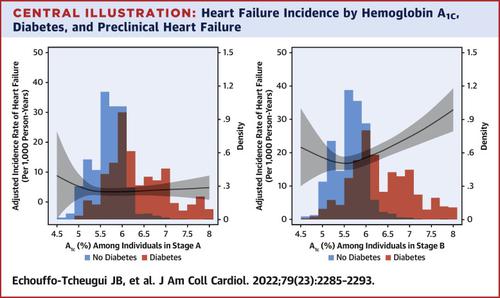Journal of the American College of Cardiology ( IF 21.7 ) Pub Date : 2022-06-06 , DOI: 10.1016/j.jacc.2022.03.378 Justin B Echouffo-Tcheugui 1 , Chiadi E Ndumele 2 , Sui Zhang 3 , Roberta Florido 2 , Kunihiro Matsushita 4 , Josef Coresh 3 , Hicham Skali 5 , Amil M Shah 5 , Elizabeth Selvin 3

|
Background
The influence of diabetes on progression from preclinical heart failure (HF) stages to overt HF is poorly understood.
Objectives
The purpose of this study was to characterize the influence of diabetes on the progression from preclinical HF stages (A or B based on the 2021 Universal Definition) to overt HF.
Methods
We included 4,774 adults with preclinical HF (stage A [n = 1,551] or B [n = 3,223]) who attended the ARIC (Atherosclerosis Risk In Communities) study Visit 5 (2011-2013). Within each stage (A or B), we assessed the associations of diabetes and glycemic control (hemoglobin A1C [HbA1C] <7% vs ≥7%) with progression to HF, and of cross-categories of HF stages (A vs B), diabetes, and glycemic control with incident HF.
Results
Among the participants (mean age 75.4 years, 58% women, 20% Black), there were 470 HF events during 8.6 years of follow-up. Stage B participants with HbA1C ≥7% experienced clinical HF at a younger age than those with controlled diabetes or without diabetes (mean age 80 years vs 83 years vs 82 years; P < 0.001). HbA1C ≥7% was more strongly associated with HF in stage B (HR: 1.83; 95% CI: 1.33-2.51) compared with stage A (HR: 1.52; 95% CI: 0.53-4.38). In cross-categories of preclinical HF stage and HbA1C, participants with stage B and HbA1C ≥7% had increased risk of HF progression compared with stage A without diabetes (HR: 7.56; 95% CI: 4.68-12.20).
Conclusions
Among older adults with preclinical HF stages, uncontrolled diabetes was associated with substantial risk of HF progression. Our results suggest that targeting diabetes early in the HF process is critical.
中文翻译:

糖尿病和心力衰竭的进展
背景
糖尿病对从临床前心力衰竭 (HF) 阶段到明显心力衰竭进展的影响知之甚少。
目标
本研究的目的是表征糖尿病对临床前心力衰竭阶段(基于 2021 年通用定义的 A 或 B)到明显心力衰竭进展的影响。
方法
我们纳入了 4,774 名临床前心衰成人(A 期 [n = 1,551] 或 B [n = 3,223]),他们参加了 ARIC(社区动脉粥样硬化风险)研究访问 5(2011-2013 年)。在每个阶段(A 或 B)内,我们评估了糖尿病和血糖控制(血红蛋白 A 1C [HbA 1C ] <7% vs ≥7%)与心力衰竭进展之间的关联,以及心力衰竭阶段的跨类别(A 与B)、糖尿病和心力衰竭时的血糖控制。
结果
在参与者中(平均年龄 75.4 岁,58% 为女性,20% 为黑人),在 8.6 年的随访期间发生了 470 起心力衰竭事件。 HbA 1C ≥7% 的 B 期参与者比糖尿病得到控制或未患糖尿病的参与者更年轻(平均年龄 80 岁 vs 83 岁 vs 82 岁; P < 0.001)。与 A 阶段(HR:1.52;95% CI:0.53-4.38)相比,B 阶段(HR:1.83;95% CI:1.33-2.51)HbA 1C ≥7% 与心力衰竭的相关性更强。在临床前 HF 分期和 HbA 1C的交叉类别中,与没有糖尿病的 A 期参与者相比,B 期和 HbA 1C ≥7% 的参与者心力衰竭进展的风险增加(HR:7.56;95% CI:4.68-12.20)。
结论
在临床前心力衰竭阶段的老年人中,未控制的糖尿病与心力衰竭进展的巨大风险相关。我们的结果表明,在心力衰竭过程的早期针对糖尿病至关重要。











































 京公网安备 11010802027423号
京公网安备 11010802027423号